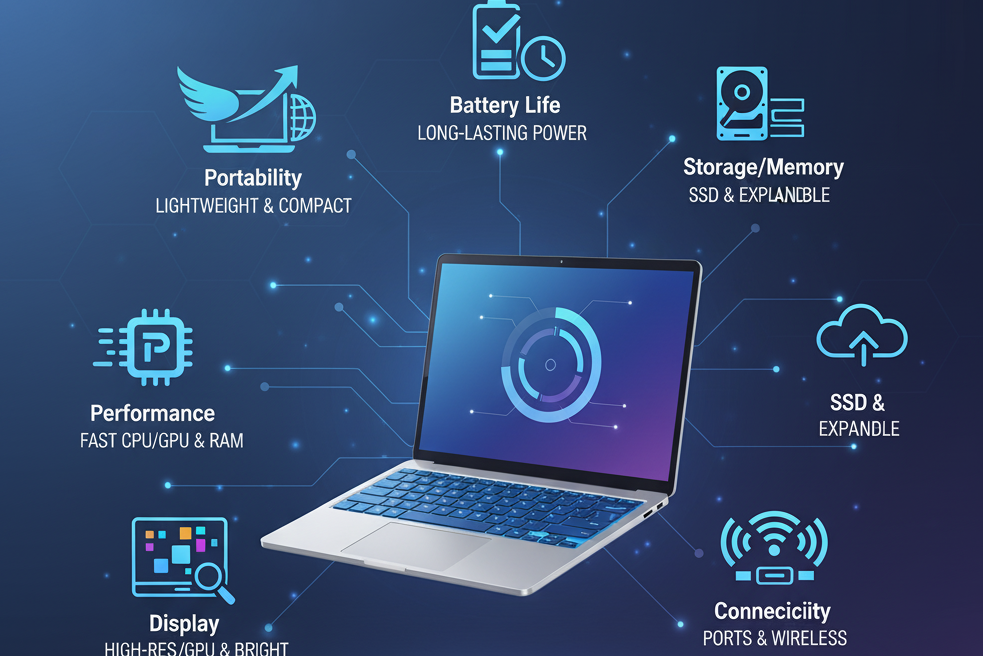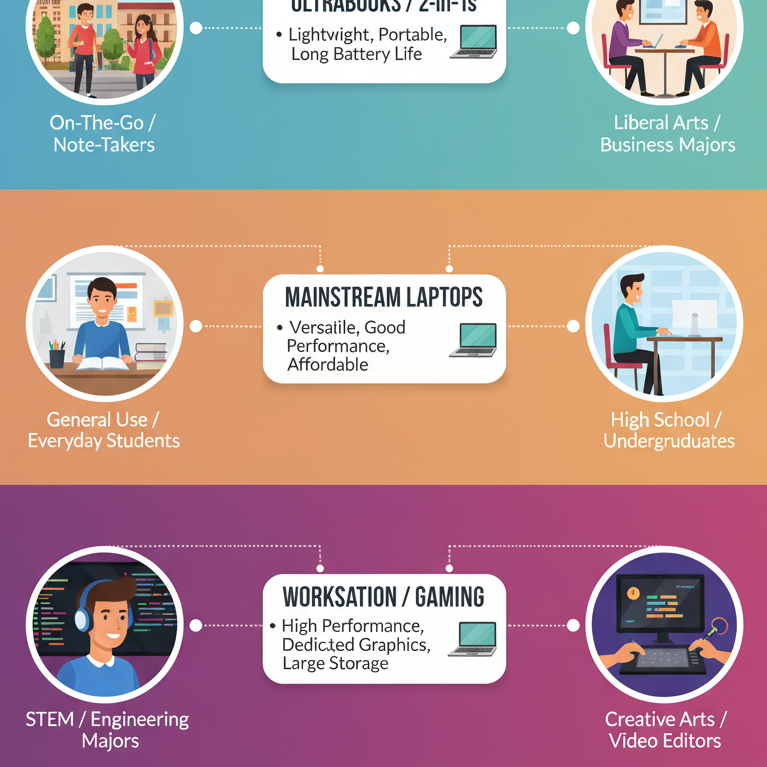In 2025, laptops are more important than ever for college, university, and high school students. A dependable machine is necessary for almost all academic tasks, including research, note-taking, online classes, finishing assignments, and even creative projects. Selecting the best student laptop can be overwhelming due to the rapid advancement of technology. There are hundreds of models available on the market, and each one has unique features, price points, designs, and performance levels. This guide offers a thorough, understandable, and comprehensive explanation of what makes a great student laptop and how to choose the best one based on your budget and field of study.
1. Why, in 2025, Do Students Need a Good Laptop?
Digital learning has become the norm in modern education. In addition to using laptops for typing assignments and watching lectures, students also rely on them for multitasking, using AI tools, collaborating online, running subject-related software, and attending virtual classes. Particularly during tests or project deadlines, a sluggish or unreliable laptop can cause needless anxiety, delays, and frustration.
In addition to their studies, a lot of students now use laptops for part-time jobs like coding, graphic design, YouTube work, content creation, and freelancing. A machine that is quick, smooth, strong, and long-lasting is necessary for all of this. Selecting the ideal student laptop is therefore an investment that will pay off in the long run for both academic and professional development.
2. The Crucial Elements Students Need to Take Into Account
It’s critical to comprehend which features are truly important before purchasing a laptop. Performance, speed, battery life, portability, and affordability must all be balanced in a good student laptop. Gamers and business professionals have very different needs than students do. The following are the key characteristics:
CPU (processor)
The laptop’s processor is its central component. The top student laptops in 2025 typically include:
- Core i5 or i7 Intel
- AMD Ryzen 5 or Ryzen 7
- For Mac users, Apple M2 or M3 chips
These offer stable performance for all academic tasks, fast loading times, and seamless multitasking.
RAM
Students should have at least 8GB of RAM, but 16GB is best for quick and lag-free use, particularly for those studying programming, engineering, or design who require more power.
Keeping
Because SSD storage is significantly faster than conventional hard drives, it has become the norm. While 512GB or 1TB SSDs are better for storing projects, videos, images, and software, 256GB SSDs are adequate for basic needs.
Life of the Battery
Students frequently study away from power outlets or attend lengthy classes. For practical use, a good student laptop should last 8 to 12 hours.
Portability & Weight
It becomes challenging to move a heavy laptop around campus. For everyday mobility, lightweight models weighing between 1 and 1.5 kg are ideal.
Quality of the Keyboard
A responsive, comfortable keyboard with smooth keys and appropriate spacing is essential for students who write lengthy essays, notes, and assignments.
Show
Eye strain is lessened by a display that is clear and bright. For reading, studying, and multitasking, a 14-inch or 15-inch Full HD screen is perfect.
Create Quality
Because students use their laptops on a daily basis, durability is important. Long-term dependability is guaranteed by a sturdy construction.

3. Student Laptop Types and Which Students Require Which Type
The perfect laptop varies by field because every student has different academic needs.
College and General Students
A mid-range laptop is an option for students who primarily attend classes, write assignments, browse the internet, make presentations, and use online learning platforms. It is sufficient to have a Core i5 or Ryzen 5 system with 8GB of RAM and a 256GB SSD.
Students of Engineering
These students make use of programming tools, simulations, AutoCAD, SolidWorks, and MATLAB. They need a laptop that is more powerful and has:
- Ryzen 7 or Intel i7
- 16 GB of RAM
- Dedicated graphics card (if software calls for it)
Students studying design, the arts, media, and editing
Digital artists, video editors, and graphic designers require:
- displays that are accurate in terms of colour
- Excellent graphics performance
- High-end processors
- A minimum of 16GB of RAM
Students in school
For online classes, browsing, assignments, and other basic needs, schoolchildren primarily require a basic, reasonably priced laptop. For them, low-spec laptops or lightweight Chromebooks are ideal.
Students of Programming
Opening several tools, IDEs, databases, and browsers simultaneously is common when coding. A laptop that has:
- 16 GB of RAM
- Quick SSD
- extended battery life
- For programmers, a good keyboard is ideal.

4. Best Student Laptops According to Budget
When selecting the ideal laptop, price is a key consideration. Here’s how to make a decision:
Category of Budget
Students on a tight budget ought to concentrate on:
- SSD rather than HDD
- 8GB of RAM is a minimum.
- Light in weight
- Good battery life
These laptops effectively manage daily tasks, assignments, and online classes.
Category of the Mid-Range
For the majority of college students, this range is ideal. These laptops have enough power to be used for programming, editing, designing, and multitasking. They provide outstanding value for the money.
Premium Category
High-end laptops are appropriate for:
- Students of media
- Professionals in engineering
- Editors
- Makers
- Students seeking durability over the long term
These laptops have the best performance, brightest screens, longest battery life, and highest efficiency.
5. Tips to Choose the Right Laptop for Your Needs
Many students purchase laptops without fully comprehending their needs. The following wise advice will help you pick the ideal one:
Determine Your Academic Needs
Seventy percent of your laptop’s configuration is determined by your field of study. Before purchasing, review the required software list or your course syllabus.
Battery life should never be compromised.
A laptop with a long battery life is more beneficial than one with a powerful but short battery if you spend a lot of time in libraries or classrooms.
Select the Appropriate Size
A 14-inch laptop is the best size for portability. A 15-inch screen provides a better workspace for intensive design or editing tasks.
Look for Practical Ports
For students who connect projectors, USB drives, or peripherals, USB ports, HDMI, Type-C, and headphone jacks are essential.
Consider the Long Term
Purchase a laptop that, even with upcoming software upgrades, will remain fast for at least three to four years.
Keyboard and Touchpad Issues
Comfort and smoothness are crucial because students spend hours typing assignments.
Prior to purchasing, read reviews.
You can learn more about build quality, heating problems, battery backup, and performance from actual user reviews.
6. Concluding remarks
Selecting the best student laptop in 2025 involves more than just purchasing the newest or priciest model. It all comes down to selecting a device that fits your long-term requirements, study style, and academic objectives. The correct laptop enhances productivity, saves time, keeps you organised, and fosters your academic and professional development whether you’re in school, college, or university.
A good laptop for students should be quick, strong, light, and effective. With the increasing use of digital tools and AI in education, investing in a powerful and dependable laptop is one of the smartest decisions any student can make. Making the correct decision now will help you in your future academic endeavours.





